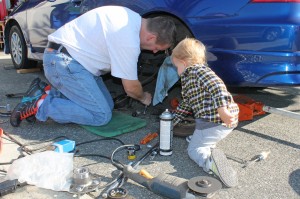Fundamental to my work on children’s working theories is exploring their interests and inquiries and ways teachers choose w hose, which and how to engage with these to create curriculum. I try to encourage teachers – and researchers – to look beyond the surface/obvious and really think about children’s underlying curiosities about life and the world they live in, and the working theories that then arise from these.
hose, which and how to engage with these to create curriculum. I try to encourage teachers – and researchers – to look beyond the surface/obvious and really think about children’s underlying curiosities about life and the world they live in, and the working theories that then arise from these.
This kind of research involves getting as close to the worlds and perspectives of children as possible and trying to interpret these curiosities from a range of evidence from children themselves, families and teachers. As I have commented before, it would be so much easier if we could read children’s minds! It takes many data sources over time to figure out very young children’s interests and inquiries. With 3-5 year olds, it is possible to ask them directly about their interests and see what they say. In both my PhD and in the TLRI we did this to help to corroborate and validate some interpretations, and see what we might have missed to that point.
The idea of children as “life theorizers (Inagaki & Hatano, 2002, p. 126) has been posted earlier. In the TLRI we worked further on this idea. We worked hard together to identify what seemed to matter most to children amongst the themes we found. We realised that the notion of identity was central to their range of inquiries and came up with the following fundamental inquiry as underpinning children’s interests, inquiries and working theories:
How can I build personal, learner, and cultural identities as I participate in interesting, fulfilling, and meaningful activities with my family, community, and culture?
Children’s identities included personal (‘Who am I?’, ‘Who are my parents/family?’, ‘What does it mean to be a girl/boy?’), learner (‘Who am I as a learner?’, ‘What learning strategies can I build here?’, ‘How will teachers help me learn?’), and cultural (‘Where do I come from?’, ‘Who am I as a member of a family/culture/ community?’). The latter incorporated inquiry into a shared national identity (‘What features do “New Zealanders” share?’). These interests and the ways they were expressed served to create a sense of multiple personal and shared identities for the children as members of peer groups, families, and wider communities and cultures.
The questions of importance that followed from this were interpreted as:
- What can I do, now that I am bigger, that the older children do?
- What do intelligent and responsible adults do?
- How can I make special connections with people I know?
- How can I make and communicate meaning?
- How can I understand the world I live in?
- How can I develop my physical and emotional well-being?
- How can I express my creativity?
For those who can access it, this work has been published recently:
Hedges, H., & Cooper, M. (2016). Inquiring minds: Theorizing children’s interests. Journal of Curriculum Studies, 48(3), 303–322. DOI: 10.1080/00220272.2015.1109711
Ethics permissions, and principles and practices I value and adhere to, mean that we can’t share any photos or video excerpts on line from our interviews with children. However, I came across the following via Twitter (which despite my misgivings in an early post has turned out to be a great way to keep in touch with many things educational) advertising Story Park which in many ways supports our findings. You may be interested in viewing these excerpts of interviews with children about their interests – and matching them with our ideas:
What are children really interested in? – YouTube
Photo credit: “Start them young 🙂” (CC BY-SA 2.0) by KaseyEriksen
I wish that I heard more talk like this, with people saying “undergraduates” where you say “children”. This is more or less how I taught pre-medical physics, in which exactly those questions are what the students said they had been shut down on by other teachers throughout their whole lives. But answering those questions, and learning how every one of the pre-medical courses contributes to doing that, is surely germane to becoming a good doctor.
LikeLike